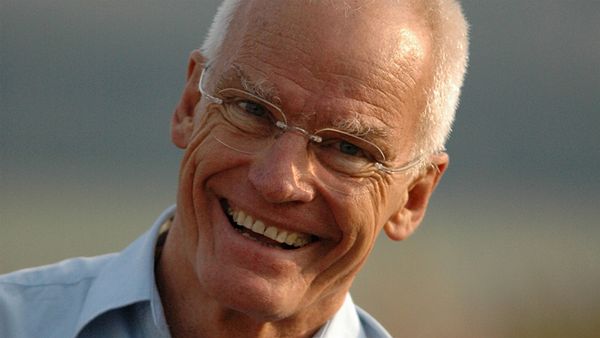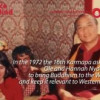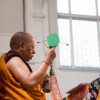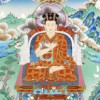Lama Ole Nydahl gave this talk at a Seminar on Psychology in Basel, Switzerland. It was originally printed in the magazine Buddhism Today in 1998 and can also be read here.
Happiness, by Lama Ole Nydahl
What do Buddhist teachings say concerning happiness?.. Basically, in Buddhism one makes a separation between conditioned and unconditioned happiness, between a relative and an absolute kind. Relative happiness has to do with experiences, absolute happiness has to do with experiencer itself. When one watches the outer world, the factories, streets, houses and cars, it is evident that they were made because beings wanted to experience something pleasant. Hospitals and prisons, on the other hand, were built in order to avoid certain kinds of suffering. Actually, beings constantly try to change outer conditions with the aim of receiving pleasant feedback. No matter how beautiful houses, cars, or landscapes may be, they cannot feel happiness. The only thing which can ever be happy is mind. What looks through our eyes and listens trough our ears right now – is where it all happens. Thus the common attempts to base happiness on outer factors are both transient and inaccurate by nature… Trying to attain lasting happiness through conditioned causes simply does not work…
What can one truly rely on in this world? Neither materialism nor nihilism. Outer and inner phenomena posses neither existence nor non-existence. The way thoughts and feelings come and go, the parts of the atom can be made to disappear, while particles may appear again from apparently empty space. That means that today both of the main extreme philosophies have lost their scientific basis. Being and non-being both cannot be proven and must be seen as two sides of the same totality… When that is the case, then what can one rely on? What has the power to hold things? There is only one thing which one can absolutely trust – the potential of space. Space is much more than a black hole or a nothingness. Often one knows who is calling before one hears the voice on the phone. Often letters arrive from people whom one has recently thought strongly about. This is not due to improved eye-sight or hearing, but to moments where we forget about being separated from the totality. When we are simply there, naked, open and resting in whatever is happening, things happen. During such moments we not only experience through our senses but through the vibration of every atom in our body. Because space and energy inside and out, are expressions of the same totality, and cannot be separated, we are always connected with everything. In Buddhism this is called the ‘state of truth’… It means that everything is part of the same totality. On another level it expresses that space is like a container – that we are inside it… It is very important to see space as something which connects beings and is alive, as a container which also conveys information between beings.
However, space has more to it than awareness, and that is what makes it interesting; it is joyful by nature. The radiance of mind itself is much richer than the conditioned experiences of joy we all strive for. The best moments in life are actually gifts and appear when beings forget themselves. There are situations where feelings of separation disappear, like being in the arms of our loved ones – the timeless moment of ‘being one’. Here mind’s innate, timeless joy can manifest, and it will become permanent when one stays beyond hope and fear in the richness of immediate experience. This state is inseparable from space, expresses its limitless qualities and is most convincing. Highest joy is thus inseparable from mind’s spontaneous insight and is a transmission of wisdom. It is mentally joyful; it is the basis of everything outer and inner and may even recognize itself through the process.
Finally, because space is unlimited, it expresses itself as love… When subject, object and experience are a totality and one cannot separate one’s own wishes for happiness from the wishes of others, one is in the absolute state. Observing the world, this feels exceedingly natural. There can be no doubt that all beings want to have happiness and avoid suffering. This full unfolding of mind is prepared by the Great Way or Mahayana Buddhism and obtained quickly through the countless skillful methods of the Diamond Way… In the Karma Kagyu lineage, which I represent, the mirror and its radiance are never separated. Space and bliss are understood as one. What looks through one’s eyes and listens trough one’s ears is clear light. It is nothing exterior. However, it is not a shiny light like from a projector. Instead, it is a constant state of freshness, an exciting here and now, and momentary insights appear in direct connection with the experience itself… This is true joy and the goal.
Such a lasting state however will only be fully realized through examining who one really is. Such an analysis will bring the conviction that one cannot be the body. Bodies change all the time. They were born, will later die and are right now in a constant state of flux. Whatever has no lasting nature cannot be truly existent. The experience that one is not the body first amazes people, then actually it is quite a relief. Who wants to be something which gets old and sick and then dies? Evidently, no transient body can be the basis of true happiness. Frustrated about the body, some people then identify with their thoughts and feelings. This is even less convincing, however. Beings’ mental states change much more visibly than their outer containers. Whoever identifies with conditioned states of mind will be really confused. The only true feelings, unchanging and timeless, like the ocean underneath the waves, are fearlessness, joy and true compassion. They are so because they appear from only one cause which never changes – the radiant and limitless space of mind. Only space is uncreated and exists through its own power. As already mentioned, it is by nature rich and playful, and as a container it is limitless. Effortlessly, it expresses compassion and unites everything. This is the goal of Buddha’s teachings. He wants beings to experience that they are the ocean rather than its waves, and he aims to free all by showing the mirror behind the pictures. Whoever can experience themselves as radiance which knows will not be disturbed by the stream of what is known. This is what Buddha wants to teach beings. The limitless joy he points to is obtained by knowing mind itself. Understanding it to be unborn and uncreated, everything in life is gift. And one feels the need to share this richness with others. From a secure mental level one uses body and speech to help beings in their many passing and confused states. Being useful to others from the level of fearless joy and compassion is the real goal.
Buddha taught different methods for getting there. For the less rebellious, who would prefer avoiding difficulties, he advised the way of renunciation, telling them to become monks and nuns. This status gives social security; one doesn’t have to stand up to confrontation and is really protected. Those who aimed to conquer life, who wanted to leave a massive track through the conditioned world, he advised to live as lay people. Here, Buddha did not focus on what to avoid, but on what is possible and attractive, on making life richer and more meaningful for others and oneself. The highest level of teachings Buddha gave for the so-called ‘accomplishers’ is on the level of view. Earlier there were called yogis, but this word makes too many people think of a Hindu with a turban. Therefore I chose the new term which focuses on the result. It includes everybody who fearlessly strives for enlightenment. Among accomplishers, the ‘view’ is king. The point here is to experience everything on the level of highest purity. To enter it one must understand that it is not necessary to die to go to a pure land and that one also does not have to go elsewhere inherently. It is a deeply liberating insight that everybody’s mind is clear light, that this even includes the very clouded consciousness of a small spider, which can only understand a few square inches of web. If, on top of that , good karma enables one to recognize everything as fresh and new, to feel every atom vibrating with bliss and kept together by love, mind can really express its joyful power. Happiness will then be lasting, and it is only a question of confidence. Whoever dares to trust one’s basic goodness and jump from the images and into the mirror is given every gift. When consciousness shifts from the wave to the ocean and turns from the experiences to the experiencer itself, there is only self-arisen joy.
A simple statement thus unifies my lecture tonight – ‘Behave like a Buddha until you have become one.’ It means lifting the level of perception and it is actually only necessary to remove the dust from one’s eyes to recognize everything as an expression of love and self-arisen perfect wisdom. To see that mind’s limitless potential is playing here and now as well as everywhere and always. Only this insight will secure a true, absolute and lasting happiness, and Buddhist meditations aim directly for that experience…
Much happiness for you and your surroundings!
Excerpt from the talk given at a Seminar on Psychology in Basel, Switzerland
Buddhism Today Vol.4, 1998. Copyright © 1998 Diamond Way Buddhist Centers USA
Buddhism Today aims to be a living document of authentic Buddhist transmission for the lay person and yogi practitioner in the West. Online subscription to the magazine is available at the website: www.buddhism-today.org
Other posts which may be of interest :
Tags: awareness, Buddha, Buddhism, Compassion, fearlessness, happiness, Kagyu Lineage, Karma, love, mind, radiance, Wisdom




 Follow
Follow